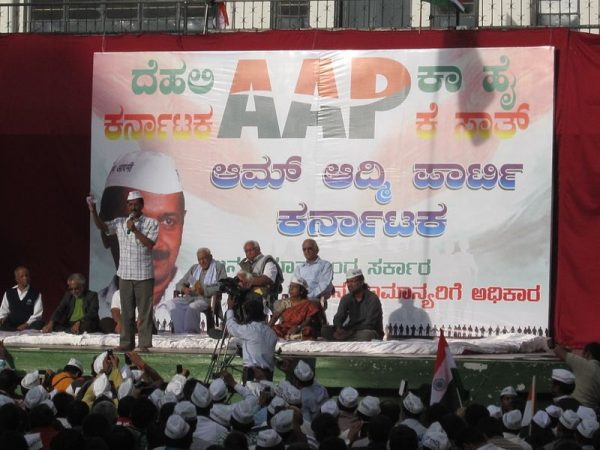A graduate of the prestigious Indian Institute of Technology and a former senior official in India’s Income Tax Department, Kejriwal became known nationally in 2011 through his association with the anti-corruption movement led by Gandhian Anna Hazare. Mass demonstrations in Delhi against widespread corruption, and their coverage through national television, made Kejriwal one of the country’s most prominent faces.
Kejriwal was responsible for drafting an anti-corruption Jan Lokpal Bill and played a key role in implementing the Right to Information Act at the grassroots level. But at the end of 2012, Kejriwal parted company with Team Anna, as the latter did not support Kejriwal’s proposal to form a political party and contest elections. When the AAP was formed in November 2012, most commentators were pessimistic about its future. But one year on, Kejriwal surprised many after his party won 28 of 70 seats in the Legislative Assembly, thrashing the long-ruling Congress Party. It’s the first time in Delhi’s history that a party other than the Indian National Congress and the Bhartiya Janata Party has taken the helm. Delhi’s previous chief minister, Sheila Dikshit, belonged to the Congress Party, and after three five-year terms she became the longest-serving chief minister in Delhi and the longest-serving female chief minister in India. Of course, the emergence of political leaders from social movements is not a new phenomenon. In India, however, while many regional parties have emerged and their leaders served as chief ministers, most parties have been developed on the basis of caste, religion, language or regional issues. And none has managed to cultivate the same profile as Kejriwal.
Although Kejriwal and his team have fought against corrupt Congress rule, his party’s minority status in the assembly has led him to accept ‘outside support’ from the Congress Party on policy issues — but he will not include any of its members in his cabinet. This makes the government dependent on a party which it has opposed, having accused it of corruption and bad governance. But the AAP has taken this decision based on wide-ranging and open consultations, and with the approval of Delhi’s ordinary voters — a true melting pot of people from almost all regions, castes, languages and religions.
In asking how the AAP and its associated movement are likely to develop in the future, some useful hints can be found in a parallel political movement which emerged in the United States a century ago. The Progressive Movement was primarily based on America’s middle and professional classes. Its origins lay in a rising anger at the end of the 19th century at the political corruption and economic concentration found in the United States. In the political realm, boss-rule in major American cities and ‘back-room’ control over political parties and the nomination of candidates were prime targets.
Crusading journalists who probed and exposed abuses played a major role in setting the agenda for the Progressive Age. The Progressives had their principal successes at the city and state level. They fought for and secured major democratic reforms, which helped to reduce endemic corruption. Among their enduring reforms were the direct election of members to the US Senate (a reform with possible relevance to India’s indirectly elected Rajya Sabha, the upper house of India’s parliament); the initiative, which allowed citizens to propose that certain laws be enacted, and the referendum, which gave citizens the right to directly enact such laws; and the recall, by means of which citizens could remove an elected official before the end of his or her usual term. Yet not all Progressive reforms were successful, with prohibition the most conspicuous failure. The unpopularity of prohibition and the onset of the Great Depression both worked to end the Progressive Age.
The road for Kejriwal is undoubtedly a long and winding one, and given India’s entrenched corruption at all levels, Kejriwal’s desire to rid India of corruption and to work in the interest of the ordinary people will be just as difficult as the task faced by the American Progressives. His emergence on Delhi’s political landscape is a welcome development, and if he succeeds in his mission it will be revolutionary. What began in Delhi may soon spread to the rest of India following the recent decision by the AAP to contest a large number of seats in the coming national elections.
Even if he succeeds only partially, Kejriwal will have a significant impact on the Indian polity and society. One thing is clear: Kejriwal has changed India’s political discourse, and the two main national parties — and others — will sit up and take notice of the AAP and its leaders. He may or may not survive long, but Kejriwal’s impact is not going to fade any time soon, unlike others in the past, such as the JP Movement of the 1970s. India’s voters have become more sophisticated and politically demanding than ever before.
Purnendra Jain is Professor in Asian Studies at the University of Adelaide.
Peter Mayer is Associate Professor in Politics at the University of Adelaide.


Really insightful and interesting. Reference to The Progressives looks pertinent and persuasive.
The idea of AAP is good one and it reflects the vibrant democratic movement in India. But the two authors in this article have overestimated the impact of AAP on indian politics. The AAP phenomenon has neither ideology nor experience. they will fall victim to their own mistakes and will find hard to compete with Congress and BJP. lets wait n watch.